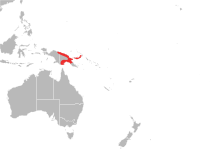| Papua snake lizard | |
|---|---|
| Scientific classification | |
| Domain: | Eukaryota |
| Kingdom: | Animalia |
| Phylum: | Chordata |
| Class: | Reptilia |
| Order: | Squamata |
| Family: | Pygopodidae |
| Genus: | Lialis |
| Species: | L. jicari
|
| Binomial name | |
| Lialis jicari Boulenger, 1903
| |

| |
| Synonyms | |
| |
The Papua snake lizard (Lialis jicari), also known commonly as Jicar's snake-lizard, the New Guinea snake-lizard, and the Papua snake-lizard, is a species of legless lizard in the family Pygopodidae.[1][2] The species is endemic to New Guinea including the Bismarck Archipelago.[1]
